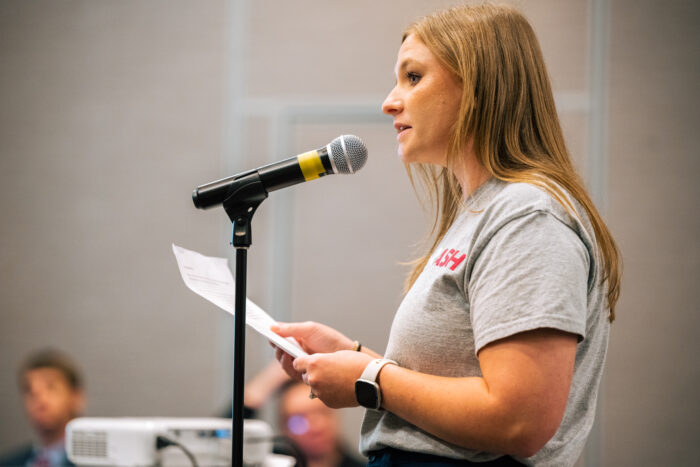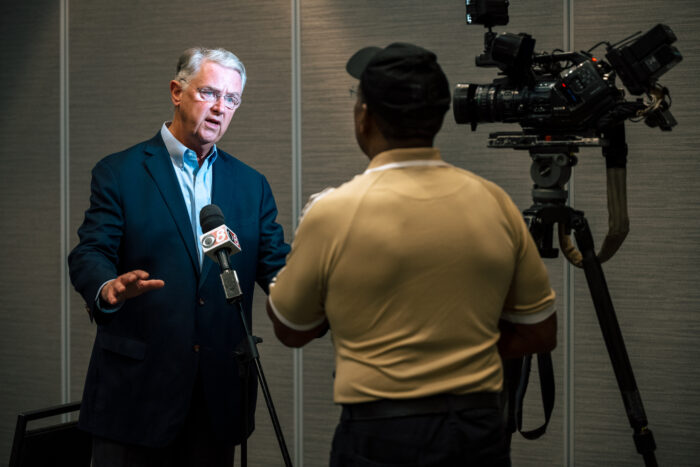Alabamians want clean water, not coal ash pollution
Abby Brown’s short walk to a microphone in a Montgomery, Alabama, hotel conference room was the culmination of years of frustration, fear, and doubt. After a long fight, the seemingly impossible was happening — she would personally tell members of the U.S. Environmental Protection Agency why Alabama utilities should move toxic coal ash from the banks of rivers across her state.

“I definitely felt the magnitude,” said Brown, who is the director of community engagement for Coosa Riverkeeper. “This was a beam of hope in what seemed like a hopeless battle, bringing hope to Alabamians that have been sick and hurting or are just concerned about toxic coal ash.”
SELC, along with a coalition of conservation and advocacy groups across the state, have long fought for Alabama utilities to move coal ash from leaky, unlined pits near waterways and out of the groundwater.
The people of Alabama deserve clean water just like their neighbors. That’s what we’re fighting for.
Frank Holleman, Senior Attorney
The Alabama Department of Environmental Management initially greenlit utilities’ plans to leave all of the toxic byproduct of burning coal in place. The plan included “capping” coal ash sitting in primitive unlined leaking pits, submerged in groundwater. Covering up toxic coal ash doesn’t stop water pollution or spill risks from floods and hurricanes.
The South’s coal ash problem
Nearly every major river in the South has had one or more unlined, leaking pits filled with toxic coal ash from power plants on its banks. Coal ash contains dangerous heavy metals like lead, mercury, cadmium and arsenic, which are known to cause cancer and other serious illnesses, according to EPA.
In addition to water pollution, catastrophic spills have devastated communities and waterways, including the largest coal ash spill in U.S. history 2008 in Kingston, Tennessee, and a 2014 spill at Duke Energy’s Dan River plant resulting in 39,000 tons of coal ash and millions of gallons of polluted water pouring into waters in North Carolina and Virginia.

One of the most experienced coal ash litigators in the country, SELC Senior Attorney Frank Holleman, said his early coal ash work with SELC was a direct response to those spills through a concerted effort to pressure utilities to clean up toxic waste. More than a decade later, SELC’s efforts have resulted in regional utilities excavating more than a quarter billion tons of coal ash and counting.
“Utilities in South Carolina, North Carolina, Virginia, Tennessee, and Georgia are moving hundreds of millions of tons of coal ash from these dangerous lagoons, but not Alabama,” Holleman said. “The people of Alabama deserve clean water, just like their neighbors. That’s what we’re fighting for.”
Threats to “America’s Amazon”
Deemed “America’s Amazon” because it is home to one of the richest varieties of plants and animals on Earth, the Mobile-Tensaw Delta fuels Alabama’s tourism economy, is a beloved area for hunters and anglers, and holds centuries of cultural heritage.
“The Mobile-Tensaw River Delta and Mobile Bay are of incalculable value to coastal Alabama,” said Mobile Baykeeper Cade Kistler. “These waters are the bedrock of the economy, quality of life, and environment in the region.”
About a 30-minute drive north of Mobile, the red and white striped stacks of Alabama Power’s Plant Barry tower over green trees lining the banks of the Mobile River. For decades, coal ash at Plant Barry has tainted groundwater with high levels of arsenic and other pollutants. The flood prone region is also one of the rainiest areas by volume in the country.

“Plant Barry’s coal ash pond is a looming disaster,” said Barry Brock, Director of SELC’s Alabama office. “Because it’s in a low-lying coastal area, a tropical storm or hurricane could cause millions of tons of coal ash to spill into the Mobile River, the Delta, and Mobile Bay.”
In September 2022, on behalf of Mobile Baykeeper, SELC and former U.S. Attorney for the Southern District of Alabama Richard Moore filed a lawsuit against the state’s largest utility, Alabama Power, challenging its plans to permanently leave more than 21 million tons of coal ash at Plant Barry in an unlined pit within the floodplain on the banks of the Mobile River.
This August, EPA proposed to deny Alabama’s coal ash plan because it is significantly less protective of people and waterways than the federal regulations require. EPA stated that rejecting the state’s plan would “protect overburdened communities and water sources from coal ash contamination, advancing environmental justice.”
Alabama’s fight continues
Brown, with Coosa Riverkeeper, was thrilled to learn EPA stepped in to deny Alabama’s coal ash program. The proposal gave Alabamians the opportunity to share their comments with EPA. According to the agency’s docket, more than 4,700 comments supporting the proposed denial were submitted.
The opportunity to comment and have mass feedback regarding coal ash gave people the confidence and encouragement to truly speak their minds.
Abby Brown, Coosa Riverkeeper Director of Community Engagement
Brown stood in front of a crowded room and told a panel of EPA representatives a deeply personal message on behalf of her family and her faith. She said she’ll continue to fight for the Coosa River and other Alabama communities and businesses who depend on clean water.
The Coosa River is home to two coal ash ponds, including one at Alabama Power’s Gadsden plant. Gadsden sits about half a mile upstream from a local water intake that provides drinking water for tens of thousands of people.
“My husband is immuno-compromised, and we’ve been walking through health issues for over 4 years now. Water contamination, heavy metals, and carcinogens are something we are always concerned about,” Brown said. “As a Christian, I was convinced that I must speak up and fight for those that are hurting from environmental injustices, like living near a coal ash pond.”
While Alabama waits for EPA’s final decision on Alabama’s proposed dangerous state coal ash program, Brown hopes EPA doesn’t listen to corporations or industries, but the people whose lives and livelihoods depend on the water.
“I hope and pray the EPA listens to the people who took the day off work or spent hours driving to come and speak their mind and share their experiences, to the people of Alabama that deserve the right to clean water.”
